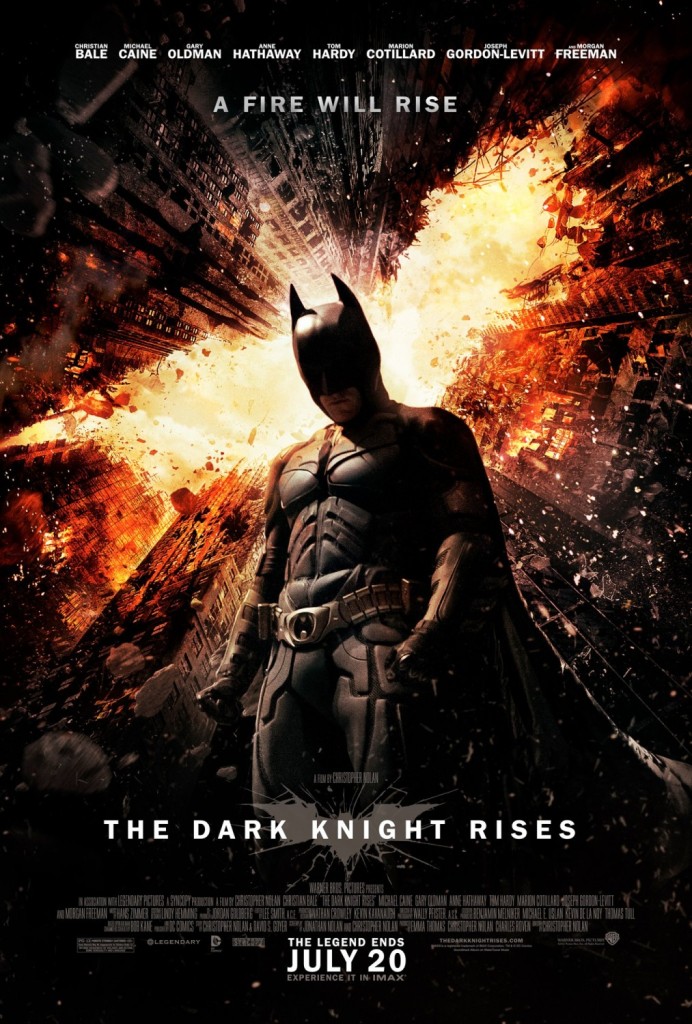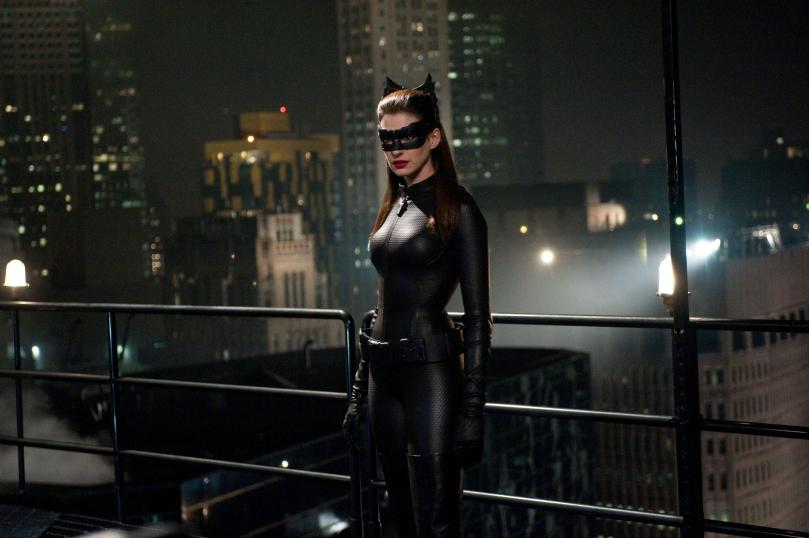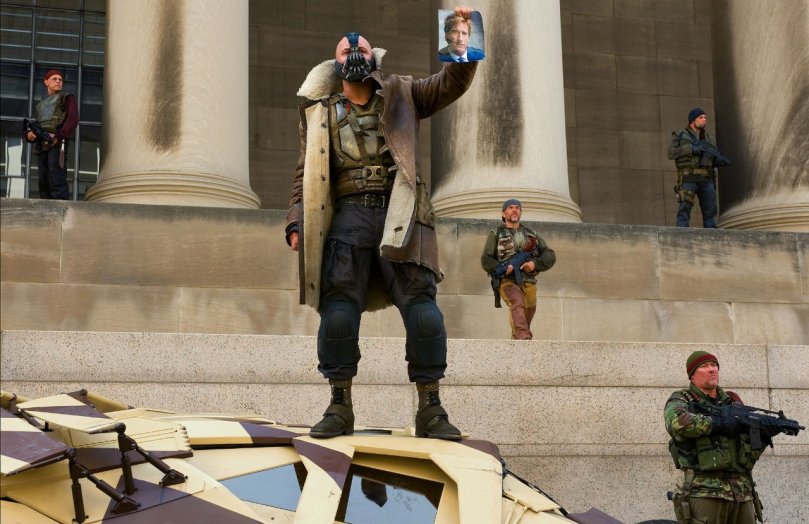“The Dark Knight Rises” is the most controversial of “The Dark Knight Trilogy.” This is both because of how people see the villain and some of the story choices that were made in regards to the timeline leading up to the film and some story choices during the film. This is a movie that you’ll enjoy more if you fill in the blanks and take it from the logic of the past films. For this reason for me it is a favorite, though I understand why people hate it, while for me…I enjoy it more than “Batman Begins” as I found the structure for this a lot better and the emotional payoff much more rewarding. This is an ending and a great ending is hard to pull off and I believe this film does it, and I’m also biased in that I loved Bane as a villain…which I know many people did not. This film is about bringing some of the character arcs we have followed the last 2 films to a close and first and foremost it does that, and it does it well, even with all the flaws.
The film was directed by Christopher Nolan who also wrote and produced it. Jonathan Nolan was one of the co-writers and the other producers were Emma Thomas and Charles Roven.
The story takes place 8 years after the events of “The Dark Knight” and organized crime has been taken down by Batman (Bruce Wayne) and the Police Department through the Dent Act, formed after Harvey Dent’s death. A lie hides over the city though as the truth behind what Harvey became is hidden by retiring Police Commissioner James Gordon (Gary Oldman) as Bane (Tom Hardy) arrives in Gotham to destroy it forcing Batman out of hiding as he must deal with this new threat and others.
The Pros: Cinematography – Wally Pfister is once again great in casting shots. From the fights with Bane that contrast his strength and power, to the shadows that Batman fights from and Gotham Occupied with the snow showing us a dead city devoid of hope and embracing despair.
The Soundtrack – Zimmer once again creates an amazing score! From the chants of Bane’s theme to the beautiful piano piece for Catwoman that shows the mystery of the character. His score has always succeeded in elevating the story and this is no different as we see Bruce Wayne go from his lowest point of despair to rising beyond the identity of Batman.
Narrative and Pacing – Narrative and pacing are the best they have ever been in the Trilogy. The story never drags and there is a clear ending rather than a bunch of climaxes. The clear beginning, middle and end compliment the story and characters and create a fantastic resolution to the story.
The World – The World is fantastic! This is a world where I don’t believe Batman ever really fully retired…as long as organized crime was around he was fighting and he had to give something for the police to chase at the end of “The Dark Knight.” Just like the League of Shadows will never ever fully go away, neither will Batman as a character or identity others can adopt. Both of these things are ideas and this movie fully captures that. Any person can adopt ideas greater than themselves and use it for good (John Blake taking up the mantel of the Bat) or Bad (Talia and Bane seeking to destroy Gotham to end it’s corruption).
The Characters – The characters continue to be one of the richest parts of the series and what will keep me coming back and even finding inspiration in them for my own writing.
Daggett and Stryver – These two were meant to show the corrupt Business world and that even without organized crime that is with the black market and drugs, Gotham is still just as corrupt…it has just become White Collar. They are fun and they clearly had fun being bad guys and in these roles who were presented as mini-bosses but were just Bane’s patsies as he was the one with the real power all along. They were the ones rules by fear and money.
Jonathan Crane / Scarecrow – Crane is back and when Gotham breaks everyone out of Gotham and Arkham he becomes one of the judges in the Kangaroo Court. This guy is awesome and there is even the chance he escaped in the end. This character is a survivor who embraces the madness in himself and around him.
Lucius Fox – Freeman continues to own this role and is there to help Bruce Wayne heal, from his coming back as Batman to helping Batman save Gotham and giving him hints he survived at the end. Lucius is the stalwart ally who is always there and is the only person not to betray Bruce’s trust.
Alfred – Alfred loses Bruce and learns how important it is to face the truth. He shouldn’t have burned Rachel’s letter about her marrying Harvey Dent as it hit Bruce in the worst place, leading to his being asked to leave…only to return believing Bruce Wayne to be dead. Luckily he finds that Bruce does grow beyond his role as Batman which is what he always wanted. Michael Caine does a great job once again.
Miranda Tate / Talia Al Ghul – Marion Collitard does a good job as Talia. Bane is the great villain (Talia is just good) and I think this is largely because she is too much of the classic League of Shadows. She uses a clean energy generator as a weapon which has bringing people back to their base nature and back to nature…calling back to the eco-terrorist roots of Ra’s Al Ghul and his League. She breaks Batman’s heart too and we learn that she could have truly been a friend and lover and been changed had they met much before this movie. It is the death of her father and his rejection of Bane that inspire her quest and identity as Bane and her had been shown the worst of humanity and saw that in Gotham. It was the pit that needed to be cleaned.
James Gordon – Gordon like Alfred deals with the consequences of the lie in “The Dark Knight.” He loses the trust of his only ally on the police force (Blake) when it is revealed and we see that. He became corrupt and the consequence was Bane faced no resistance from the populace and the populace embraced his revolution to take Gotham apart. He finds resolution though when he learns that he inspired Bruce to become Batman and helped Bruce to heal when he needed it most. We also see him becoming a healer again at the end as he is one of the few leaders left in a city torn apart by war. Gary Oldman truly inhabited this role.
Selina Kyle / Catwoman – Hathaway is fantastic and is my favorite Catwoman! She is a character who does what she wants but also seeks to become more as she wants freedom which we see she never had due to her financial state and being trapped where she lived and in how she dealt with it by becoming a thief. She shows virtue though as she comes back to save Gotham and saves Batman from Bane before Bane kills Batman. It is partially thanks to her that Gotham is saved. She becomes a hero and in it finds freedom.
Bane – Tom Hardy is awesome in this role! Bane is one of my favorite villains in this series along with Two-Face, the Joker and Scarecrow. He is threatening in both body and how he carries himself and psychologically. His arc is showing his ideals are true, that humanity will destroy itself and to fulfill the League’s quest to destroy Gotham. He gets this perspective from his time in prison and the price that was taken on him for saving Talia from the mob who killed her mother. He loses everything and is stronger for it as all he has to live for is Talia and the ideals of power. It takes Catwoman shooting him with the Batpod. I wanted to spend more time with this character. There is so much depth and threat to this guy and so much unknown, even with all we learn. Like the Joker there is mystery there…and it lends power to the character.
John Blake / Robin – John Blake is my favorite Robin (Robin is actually in his full birth name) he is the orphan who discovers Bruce Wayne is Batman when Bruce visits his orphanage as a kid. This inspires him to become a cop and we see that he is the one with Gordon fighting against the occupation by Bane and having the most success. Joseph Gordon-Levitt is awesome in this role and if more films had been made of him in the role as Batman or Nightwing working with Batman I’d have been there, or read them had they made comics about it. This character has depth and isn’t a punk but an idealist who loses the idealism and goes his own way, becoming the new Batman.
Bruce Wayne / Batman – Bruce Wayne’s arc is moving on from the loss of his parents and Rachel as the truth of both when he loses everything (his company, identity as Batman and being unstoppable, Alfred and Gotham) and after losing everything he finds Bruce again and is able to transcend the Batman identity and grow. Bane breaks him and it is in the breaking that he can heal from the scars he never addressed. The Pit is as much in his mind as it is a physical Pit and it is only in rising from both that he manages to save Gotham and himself. This is Christian Bale at his best as we see his full range of anger, despair, hope and content. This film is the much deserved resolution Bruce has been seeking since he lost his parents so long ago. Now he can be Batman and Bruce Wayne. The world is his and whatever he chooses to do it will no doubt be to help others as before but as a truly healed person, not the broken vigilante he was before.
The Breaking of Batman – This scene is powerful as Bane shows that he inhabits the idea of the League of Shadows and Batman better than Batman. He is the manipulator from the shadows who fights psychologically and physically. He breaks Batman totally and leaves him to suffer while Gotham is destroyed. It is powerful scene as he knows how small Bruce Wayne is in his identity in the end.
Climbing the Pit – The Pit is there to remind Bruce Wayne that he is more than Batman. He had gotten beyond fear and in doing so had nothing to live. In becoming an ideal he had trapped himself inside the ideal. It is only when he leaves room for fear to fail that he rises about it and finds Bruce Wayne again, which is the identity he lost the moment his parents were shot. Climbing the pit is healing both physically and mentally and becoming more than he ever was before.
What Desperation Can Breed / Revolution – Gotham is separated between the extreme rich and extreme poor. This leads to the revolution that Bane incites that leads to the easy occupation of the city and letting the city eat itself before it’s inevitable destruction.
The Cost of Batman’s Victory in “The Dark Knight” – The cost of victory is the occupation and death of Gotham. The mayor and all areas of authority get destroyed over the course of the war. Even though the city is saved from the bomb, the scars Bane left on the city will probably never be healed…which I think is something both Blake, Bruce and Selina realize, which is why they’ll be around to help. They have left the city, but everyone returns to Gotham.
Importance of Truth – Bane is able to so thoroughly break Batman and the city by revealing the truth of Harvey Dent which riles up the city against the rich and authority. There is only a small resistance and the mob turns on itself showing that the lie to save Gotham did nothing as eventually the city did turn on itself. The city’s base self was laid bare.
The Ending / The Power of Ideas and Growing Beyond Self – I felt this was done beautifully. Gordon realizes the child he comforted whose parents were shot (Bruce Wayne) became Batman, his friend and ally. Blake becomes the new Batman as he realizes the structures of Gotham are ones he can’t work with and he sees the corruption that Gordon saw but chose to work within to change and Selina and Bruce transcend their past identities becoming fully free…off the radar and the map and free to be whatever they want to be. Batman becomes Bruce Wayne which can hold both identities and more. Alfred get’s his happy ending finding that Bruce found happiness too.
Okay: The Writing – There are awkward dialogue moments and some extremes that shouldn’t have been in here (Batman having no cartilage in his legs, and his “retirement”), but the strengths of the characters and other moments like any moment with Alfred or the fight with Bane elevate it. So I’m putting it as okay.
The Cons: Talia’s Death – This wasn’t done well. She didn’t have to say anything…we knew her father’s dream was done if the bomb went off.
Dialogue Moments – There are some awkward dialogue moments in this…for example in the finale fight as Batman and Bane stare awkwardly at each other. It is stilted, but once they get fighting it is fine. There are other moments of wooden dialogue too, luckily they are only moments and not consistent.
This is a film that ends the Trilogy really well. Batman moves on and at the very least becomes International. This film captures the idea behind “Batman Inc.” in many ways as we see him abroad but setting things up for Blake to inherent the mantel of the Bat. Bruce Wayne is both Batman (fixing the Bat Light) and Bruce Wayne (his living openly abroad). This is something he never had in any of the past films. Bruce Wayne was only Batman in the past films as he was unable to live beyond his obsession. It is only in realizing that Gotham will always have problems and need protecting but that can happen and he can live too. He takes Alfred’s advice and stays true to himself. In that way Batman dies so that Bruce Wayne who inhabits both identities can rise and there is something beautiful in that. I get why people hate it, but our heroes shouldn’t stay static. Let Bruce Wayne grow as all characters should so he can be more than just the traumatized child lost in fear. Bruce Wayne deserves better than that and this Trilogy is his story, his growth, his rising.
Final Score: 9.9 / 10





